Spotlight
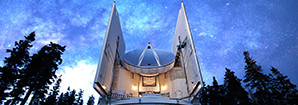
Event Horizon Telescope Results to be Revealed April 10
Arizona/Steward EHT members Dan Marrone (press conference participant), and Feryal Ozel, Dimitrios Psaltis, CK Chan, Lia Medeiros, Junhan Kim and Arash Roshanineshat will be at an NSF press conference Wednesday, April 10.
From Astronomy/Steward's Dept Head and Director Buell Jannuzi:
"The Event Horizon Telescope is a global collaboration working to image black holes at event horizon scales. This effort involves assembling an array of telescopes observing at a wavelength of 1.3 mm in the radio band, with stations in Chile, Hawaii, Arizona, Mexico, Spain, and Antarctica.
Via an NSF press release and global simultaneous announcements, the EHT is scheduled to announce groundbreaking first results [on April 10 at 9am EDT] from data collected during the 2017 observations. The release event will include a panel of EHT members providing coherent analysis and interpretation of this unique and exciting experiment.
In addition to Steward Obseratory’s Dan Marrone, the EHT panel will include Shep Doeleman, Avery Broderick, and Sera Markoff.
At the NSF press release and representing the UA and NOAO’s large research contribution to these scientific results will be Arizona EHT members Feryal Ozel, Dimitrios Psaltis, CK Chan, Lia Medeiros, Junhan Kim and Arash Roshanineshat. The streamed press conference starts at 6 a.m. MT. Steward folks can watch it together in N305. Others can watch it online HERE.
Please also consider joining us for another special event --
Special Steward Observatory Public Evening Talk – Wednesday, April 17, 2019
Join us for a talk with key members of the Arizona team involved with the Event Horizon Telescope as they share the monumental efforts required to photograph black holes and discuss how we will know if Einstein was right. Q&A with refreshments to follow.
Location: ENR2 Building, Room N120
Natural Resources 2 Building Auditorium N120
1064 E. Lowell Streetm University of Arizona Campus
General Seating
Parking: 6th Street Garage
Date and Time:
Wed, April 17, 2019
7:30 PM – 9:00 PM MST (Doors open at 7PM)"
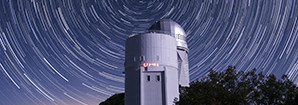
Beijing-Arizona Sky Survey Completed
The Beijing-Arizona Sky Survey (BASS) completed its observations on the Bok Telescope on February 13, 2019, after surveying the sky for 375 nights over the last four years. The BASS survey is an ambitious wide-field multicolor survey of 5000 square degrees of the Northern Galactic Cap, using Steward Observatory's 2.3m Bok Telescope and its 90Prime imager at Kitt Peak. It is an international collaboration between the Chinese team led by NAOC and the US team led by Steward Observatory. The survey is led by Drs. Xu Zhou and Hu Zou at NAOC and Dr. Xiaohui Fan at UA.
The BASS survey is part of the DESI Legacy Imaging Surveys, which use three telescopes: the 4-meter Blanco Telescope in Chile (the DECam Legacy Survey, or DECaLS), the Mayall 4-meter telescope at Kitt Peak (the Mosaic z-band Legacy Survey, or MzLS), and Bok, to image about 14,000 square degrees of the sky to approximately 24 magnitude in 3 optical bands, to a depth of a factor of four deeper than the famous Sloan Digital Sky Survey over the same area. A key goal of these three surveys is to provide the input catalog for the target selection of the upcoming spectrographic survey, the Dark Energy Spectroscopic Instrument (DESI), which will commence on the Mayall Telescope on Kitt Peak later this year. With a new powerful 5000-fiber spectrograph on Mayall, the DESI project will measure the distances of about 30 million galaxies and quasars aiming at providing new measurements of the expansion history of the universe and the nature of dark energy. Arizona is an institutional partner of DESI.
In addition, the BASS survey, together with DECaLS and MzLS, will provide astronomers deep imaging data to pursue a wide range of astronomical researches ranging from nearby cool brown dwarfs to distant galaxies. UA astronomers led by Dr. Dennis Zaritsky have been using these data to search for diffuse dwarf galaxies, and a team led by Fan have utilized the surveys to uncover distant quasars. BASS is an open survey without proprietary period. Raw data are released immediately after they are obtained through the NOAO Science Archive and China Virtual Observatory. The final images and catalogs will be released through both the DESI Legacy Imaging Surveys data release 8 (DR8) this spring and the BASS DR3 this summer. (Text by Professor Xiaohui Fan.)
The Figure at the top of this article can be seen in all its glory HERE. It's a time lapse taken by one of the BASS observers. The second Figure is HERE. It's a map of the sky with BASS and other surveys outlined.

Project Manager Bradley Williams Named a 2019 Flinn-Brown Fellow
Project manager Bradley Williams has been named a 2019 Flinn-Brown Fellow. To quote the website, "Every year, 30 Arizonans are selected for the Flinn-Brown Civic Leadership Academy through a competitive statewide process. Flinn-Brown Fellows are committed to expanding their knowledge, skills, and networks to help address Arizona’s long-term issues..." You can read his accolade at Lo Que Pasa (towards bottom of the article).
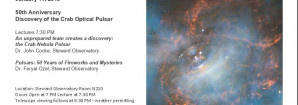
50th Anniversary of the Discovery of Optical Pulsations of the Crab Nebula Pulsar
The optical pulsations of the Crab Nebula Pulsar were discovered 50 years ago by Stewardites John Cocke, Mike Disney and Don Taylor using the Steward 36" telescope on Kitt Peak. On Jan 14 (the link is a blowup of the picture) we celebrated the anniversary, bringing John Cocke to Tucson to talk about what happened in 1969, and having Feryal Ozel give a more current perspective. A link to the podcast is HERE.
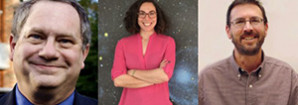
Three Faculty Win Awards
Professor Robert Kennicutt, Ass't Professor Erika Hamden, and Mirror Lab Project Scientist Buddy Martin have recently been recognized with awards.
Rob, who recently rejoined us after a decade in Cambridge, UK, has won two recent awards. The first is from the National Academy of Sciences and is called the 2019 NAS Award for Scientific Reviewing. The second is from the RAS, one of the 2019 Gold Medals of the Royal Astronomical Society. The UA press release can be found HERE.
Assistant Professor Erika Hamden was recently named a TED2019 Fellow. You can read the press release HERE.
Faculty member Hubert (Buddy) Martin, Project Scientist of the Mirror Polishing Program at the Richard F. Caris Mirror Lab, received the SPIE's A.E. Conrady Award. We quote the citation here: "Dr. Buddy Martin has been awarded the A.E. Conrady Award in Optical Engineering for his contributions to the polishing of large mirrors, including those for the GMT. Dr. Martin has been the guiding hand in the polishing of the GMT mirrors." You can find the press release HERE.
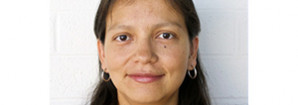
Paola Pinilla Receives a 2018 Sofja Kovalevskaja Award of the Alexander von Humboldt Foundation
Steward Postdoc Paola Pinilla has received a 2018 Sofja Kovalevskaja Award of the Alexander von Humboldt Foundation. Paola is at center bottom of the image on the award page. Paola will leave for Germany in Summer 2019, and will have the funding to create a research group at the Max Planck Institute for Astronomy, Heidelberg, Planet and Star Formation Department, for a five-year period. Congratulations, Paola.
Pages

For Public
Public events include our Monday Night Lecture Series, world-reknowned Astronomy Camp and Mt Lemmon Sky Center.

For Students
A good place to start if you want to become an undergrad major or grad student, or need to find our schedule of classes.

For Scientists
Find telescopes and instruments, telescope time applications, staff and mountain contacts, and faculty and staff scientific interests.




